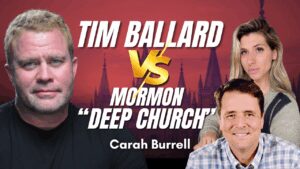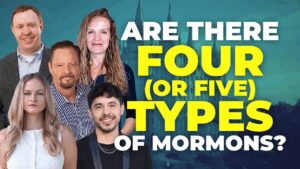Join us for a review of Fiona and Terryl Givens’ new book: “All Things New: Rethinking Sin, Salvation, and Everything in Between.”
According to Amazon: “In this book, Fiona and Terryl Givens trace the roots of our religious vocabulary, explore how a flawed inheritance compounds the wounds and challenges of a life devoted to discipleship, and suggest ways of reformulating our language in more healthy ways all in the hope that, as B. H. Roberts urged, we may all cooperate in the works of the Spirit to find a truer expression of a gospel restored.”
Panelists include Jana Spangler, Anthony D. Miller, and Brittney Hartley. We would love you to join us to share your questions and comments.
“All Things New: Rethinking Sin, Salvation, and Everything in Between” by Fiona & Terryl Givens can be found by following this link.




6 Responses
I am excited to listen to this and think this is a great hope and concept – however this is like so many other items in this religion – its an uphill battle/fight. When will the top brass learn the rank and file are wanting more inclusiveness. Its a long way out when the top cheese continually press the covenant path, covenant path no empty seats stay in the boat. The language also is rooted in McConkie’s talk from 1978 Sept 3 at BYU. There are a lot of “I Knows” in that bully pulpit pounding speech. Especially after being at BYU two weeks earlier saying the now touted as unofficial overly pointed too priesthood ban ‘we’re sorry’ statement. Forget everything we said we now have greater light and knowledge statement. Anyway reading those two talks in the past month has really bothered me.
I would love to see church culture change in this direction. However until the top brass do it consistently from the GC and change their language seeing it happen on local levels will only be a roulette happening.
This is a very interesting podcast. The Givens are brilliant in trying to bring Mormon thought into the modern age, however outside mainstream Mormon thought it may be. But what strikes me as I listen to this and think about the various theological/philosophical ideas about gods, truth, pre-existence, the meaning of life, cosmology, sin, atonement, creation, etc., is that we are all just moving about in a darkened room, trying to make sense of it all. Some ideas are very helpful and uplifting– like those presented by the Givens. Others are very painful and hurtful– like many old ideas within the LDS Church and Christianity at large. So there is a reason to try to construct a theology to help us deal with our humanity and to attempt to make a positive contribution toward humankind in helping us see each other on an equal plane. But in my mind, we need to realize that all the scriptures, all the claims by prophets, the writings and talks by church leaders, philosophers, and commentators are just speculation. I do not believe that anyone has been shown how we came about, the reason we are here, and what occurs after death (darkness or some other type of continuation). We tell ourselves stories to try to overcome our insecurities and fears and try to deal with the inevitable facing us all. We all live under a death sentence. We just don’t know when we will be called up. That is what drives religion and philosophy. We all try to make sense out of the unknown. We are all in it– together. That is what makes it so essential that we learn to love and respect each other. If religion helps us do that, then it’s worthwhile (at least to that extent). But we need to all acknowledge that this entire process is a big (sometimes, very educated) guess.
Thanks so much to all four of you on this podcast – I found the depth and breadth of the ideas you brought out here really wonderful and inspiring both intellectually and spiritually.
I feel inclined to throw the baby out with the bath water when it comes to religion. I have considered the counsel of several of the prophets when they stated; either the story of the restoration of the gospel is true and of the greatest importance to human kind or it is a horrendous lie. I have concluded the latter is true and I feel much better since making the move to rid my life of any belief in religion. I personally believe that morality and ethics (the golden rule) should be taught independant of religion. Besides, do religious leaders always live the golden rule or even obey the commandments or do they take great lisence in their intrepreting of scripture to to their advantage?
I think Britts statement about how having a prophet prevents someone from strapping a bomb to themselves and killing others is not accurate . A carismatic religious leaders words and actions sometimes have the same affect on the lives of those who fall under his influence. Think Jim Jones, David Koresh, Sun Myung Moon and yes, Joseph Smith and his introduction of polygamy and blood atonement. Where do you think B. Young learned it (blood atonement)? I am of the opinion that the influence and practice of the ideas introduced by carismatic religious leaders has emotionally traumatized, silenced and left countless people to live sad and miserable lives. Some others, I am sure, may have felt their circumstances in life elevated so long as they conformed to the edicts of the leaders.
It’s either true or it isn’t. The truth is not negotiable; it is what it reveals itself to be and the evidence has lead me out of religion. I am open to the possibility that I may be wrong but it will take God parting the heavens and revealing its truth to me personally before I will believe differently.
I found the part of this podcast suggesting that not many people are losing their faith in the LDS church because of the doctrines concerning atonement interesting, because feelings of guilt and doubts about self-worth brought about by the way the atonement is used in the church were my primary reason for leaving. After enjoying this podcast, I’ve started reading this book. One thought I’ve had after reading chapter 1 and part of 2, which I don’t remember being discussed in this podcast, concerns a possible connection between the concept of seeing God as a loving parent and increased feelings of guilt and doubts about self worth. In my personal experience, having been taught as a Latter Day Saint to think of Heavenly Father as a loving father in heaven, when I don’t get answers to prayers or the help I am praying for, I see two possible explanations: 1). In God’s wisdom, He is refusing to answer or help me right now. 2). My faith is not strong enough or I am not worthy enough right now to receive the answers or help I am seeking. Certainly option 1 is always there, but personally, I feel like if you choose it too often Heavenly Father starts to seem like a really bad and unloving parent, so I feel that in attempting to maintain the view of God as a loving parent, there is a natural tendency towards choosing option 2. Thus one of the two ideas that the Givens are saying is essential to an uplifting view of the doctrines of the gospel, at least in my experience, can increase the problems of guilt and low self-worth that , as I understand its goals, this book is attempting to address. Certainly the idea of heavenly parents that are watching over us, who love and care about us ,can be very comforting as long as you are able to reconcile your life experiences with that view. But, on other hand, I find this view of God can be very hurtful when life brings challenges that you find difficult to accept as the will of loving parents. In general, a belief in any kind of interventionist gods requires one to reconcile why and for whom they intervene or do not intervene, but I have personally found that the concept of heavenly parents can often bring deep hurt in the form of feeling either neglected or rejected when you felt you most needed intervention.
It was brought up that there does not necessarily need to be a pre-existence, and that the need for one is sort of just jumped to in the book without leading the reader there. One thing I believe I have heard Fiona say in regard to the need to have a preexistence is that there is a problem introduced in creation itself. If God creates flawed humans that sin and error, then God is responsible for that sin and error, and we do not have responsibility for the sin. The example being if an architect builds a bridge and the design is flawed such that it falls apart and crumbles down under its own weight, does the fault lie with the bridge or the designer. By having humans exist eternally with God, god is no longer responsible for the sin. The whole idea is of flawed humans being responsible for their own flaws and shortcomings is problematic if God created the human intelligence. This is solved by needing human intelligence to exist eternally just like God prior to the creation of the body and world etc.